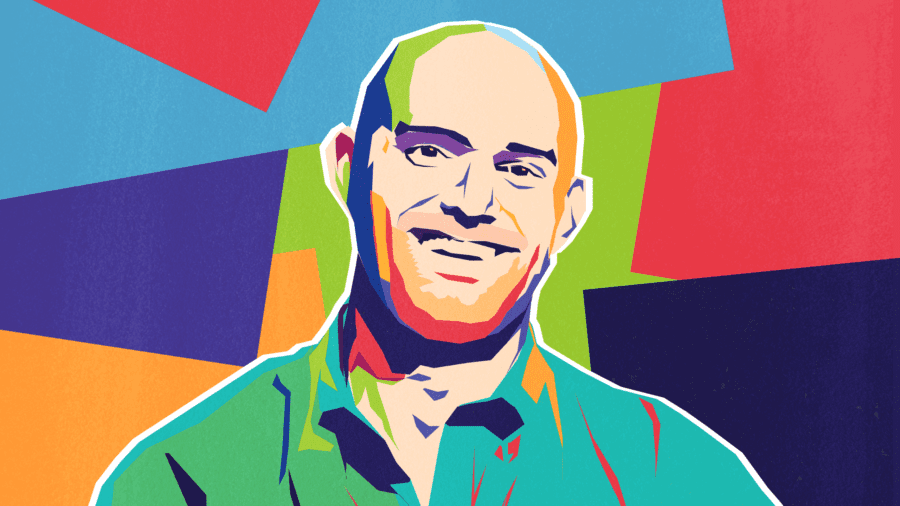
11 Ways to Structure Your External Environment to Regulate Your Mind According to Andrew Huberman
Do you know how to optimize your routine and external environment to regulate your mind?
We can adopt certain tools that relate to our external environments to optimize our brains, and we can learn a great deal about these tools from Dr. Andrew Huberman.
Dr. Andrew is a neuroscientist and professor at Stanford University who teaches in the department of neurobiology. He also runs the Huberman Laboratory at the Stanford School of Medicine. On top of his teaching responsibilities and research, Dr. Andrew also produces the Huberman Lab podcast, where he gives incredibly informative and actionable guidance.
He is an expert at teaching how to calm your nervous system as well as how to change your brain. With his exceptional teachings, you can optimize your external environment to enhance your mind.
In this article, you’ll learn 11 ways to structure your external environment to control and enhance your brain’s functions.
#1. Avoid Light and Screens Before Bed
A crucial part of getting the most out of your brain is sleeping and enhancing sleep quality. In the age of the internet and smart devices, many fall into the trap of undermining their sleep by looking at screens before bed.
You reduce your sleep quality when you view light before bed, including light from your smartphone or television. You should try to avoid light as much as possible between the hours of 10 pm and 4 am, as viewing artificial lights at night will disrupt your circadian system.
Contrary to popular belief, blue blockers will not fully protect you from a poor night’s sleep. Blue light is especially bad for your circadian system, but all light poses a problem for your sleep quality.
If you go to bed past 10 pm, consider only using candlelight to navigate your home. Additionally, avoid activities that can disrupt your sleep, such as scrolling on social media and watching television.
Your sleep quality directly impacts your ability to regulate your mind, and good quality sleep will also reduce stress and assist your immune system, emotional stability, and hormone augmentation.
#2. View Bright Light in the Morning
Another key part of getting quality sleep is viewing bright light in the morning. Sunlight will always trump artificial lights, even if it’s overcast. If possible, go outside when you first wake up, or if you wake up before the sun, view bright artificial lights. Once the sun rises, go outside and view natural lights.
Unfortunately, not everyone has access to the sun upon waking. Those who don’t have access should view strong artificial light sources, such as seasonal affective disorder (SAD) lamps.
The amount of time you should spend outside will depend on the weather. If it’s a bright, sunny day, you only need around ten minutes outdoors, but if it’s especially cloudy, try to spend between thirty and sixty minutes.
You don’t need to look directly at the sun — in fact, you should definitely NOT look at the sun — but you should avoid wearing sunglasses and standing in the shade during your morning time outside.
Viewing bright light in the morning is critical for your brain and sleep health because it will peak your cortisol levels, making you more awake and alert. Our cortisol peaks every 24 hours, and if your peak occurs later in the day, you’ll struggle to fall asleep that night.
Looking at bright lights when you first wake up is essential to setting a healthy circadian rhythm and will enhance your brain and focus during the day.
#3. Limit Alcohol Consumption
Alcohol consumption is exceedingly common in many societies, but unfortunately, it’s detrimental to our motivation. The way in which we metabolize alcohol is the same way we metabolize poison, and this directly impacts our brain health, even when consumed in moderation.
Consuming alcohol can lead to increases in stress, neuro-degeneration, and inflammation, and it even increases our risk of developing cancer.
In terms of our motivation and focus, alcohol acts as a sedative, so rather than helping you focus, it reduces your alertness.
Have you ever had a large glass of wine and felt sleepy afterward?
That’s because it acts as a depressant for your central nervous system, but believe it or not, alcohol dramatically reduces sleep quality. For this reason, you should be especially cautious about drinking alcohol within three to four hours of going to bed.
#4. Avoid Cannabis
Marijuana usage has become increasingly common as more states decriminalize and legalize the substance. Although there are studies indicating that cannabis has a positive impact on chronic pain, it can also decrease your ability to focus and retain information.
Cannabis stimulates the endocannabinoid system by parking in our cannabinoid receptors. Stimulating the endocannabinoid system leads to forgetfulness, so according to Dr. Andrew, those who use marijuana could improve their memory and cognitive function by quitting.
Those who do not yet have a fully developed brain should be especially cautious about cannabis usage because it can hinder brain development and can lead to mental health problems such as anxiety. Your prefrontal cortex doesn’t fully mature until age 25, so you should be especially wary about cannabis usage if you’re under that age.
#5. Optimize Your Exercise Routine
You’re likely aware that exercise plays a key role in your physical health, but did you know it’s also crucial for your cognitive health?
When you perform cardio exercises, you activate the brain-derived neurotrophic factor molecule, which helps repair and form brain cells. It also improves your blood flow throughout your body, including your brain, which clears toxins and helps develop brain cells.
You can also adjust your exercise schedule to optimize your routine and energy. When you exercise within 30 minutes of waking up, your body develops an anticipatory circuit that causes your body to want to wake up at that particular time. For example, if you want to develop a morning routine of waking up at 6 am, you can train your body to adopt that schedule faster by exercising around that time.
Exercising in the morning will also help you feel more awake and alert as you start your workday, thereby increasing your productivity and ability to focus.
This is also a great way to feel energized in the morning without caffeine. Dr. Andrew encourages people to avoid caffeine until 90 to 120 minutes after waking. Instead, consider going outside and exercising when you wake up.
Exercising early in the morning will also help you spike your cortisol levels, which will help you adopt a healthier sleep schedule.
Join In 200 Million+ On The Journey to Greatness
#6. Scheduling Time to Rest
Rest is a key part of pursuing your goals and optimizing your mind’s ability to focus and retain information. People often neglect this crucial part of regulating the brain because they attach their pleasure and goals to external rewards.
Pushing yourself toward accomplishing your goals for an external reward such as a promotion at work or a finished creative project will only get you so far — you also need to enjoy life outside of what you want to achieve.
Allowing yourself to rest and enjoy life will help you become more tenacious amidst life’s challenges. It will also increase your serotonin levels, making you feel rejuvenated as you strive toward your goals. Additionally, you’ll feel more focused and alert after you rest and recover.
#7. Create an Ideal Atmosphere for Yoga Nidra
One incredibly effective form of rest is Yoga Nidra, meaning Yoga sleep. This practice has tremendous benefits for your energy levels and cognition. According to Dr. Andrew, it can also help you fall asleep easier at night, reduce stress, and enhance your ability to learn. He refers to this practice as a form of non-sleep deep rest.
The practice calms you into a restful state through deep breathing and guided meditation that focuses on different areas of your body. There are many guided Yoga Nidra videos available on YouTube including a ten-minute practice directed by Dr. Huberman.
So how do we create the best atmosphere for this guided practice?
Technically, you can do Yoga Nidra anywhere and at any time, but it’s preferable that you sit or lie in a comfortable position as you follow along with the guided meditation. You’ll also want to find a quiet space or use headphones or earbuds to drown out unwanted noise. This will allow you to focus on the different areas of your body and your breathing as you follow along with your Yoga Nidra instructor.
#8. Optimize When and Where You Eat
Dr. Huberman has offered a lot of guidance for optimizing your food intake for brain health, and one key part of enhancing your food intake is determining the best times to eat.
In order to ensure that you get the best night’s rest, you should stop eating at least two hours before bed. Additionally, you can prioritize different types of food depending on the meal. Dr. Huberman eats high-protein foods during lunch as well as vegetables and fruit.
For dinner, he tends to eat a little bit of protein and prioritizes intaking high levels of starch. Starches activate the tryptophan and serotonin systems, which help you fall asleep.
If you eat breakfast, consider enjoying the meal outside so you can get more natural light in the morning, as we discussed earlier.
Finally, you can ingest foods that are beneficial for your brain’s health and performance. These include dark-skin berries (including blackberries and blueberries), egg yolks, fatty fish high in Omega 3s, creatine, and foods containing phosphatidylserine, such as soy and chicken liver.
#9. Create an Ideal Environment for Interoceptive Meditation
You’re likely aware of meditation and may even know that it’s a helpful tool for focus, stress reduction, and learning, but did you know that there are many different types of meditation?
The optimal type of meditation you may want to practice at a given moment will depend on your state of mind. According to Dr. Huberman, some people are more interoceptive while others are more exteroceptive, and which one you are dictates your ideal form of meditation.
What does this mean?
If you’re more interoceptive, you likely become distracted by internal processes such as your breathing and thoughts. Those who are more exteroceptive are more distracted by external things, meaning anything outside oneself.
How interoceptive or exteroceptive you are may also depend on your current location or mood. For example, if you’re sitting alone in a dark room with few external distractions, you’re likely to feel more interoceptive.
When engaging in a meditative practice in a given moment, you can decide whether an interoceptive or exteroceptive approach will benefit your current state.
If you find yourself distracted by external things in a given moment, you likely want to engage in an interoceptive meditation practice where you primarily focus on your internal processes.
With this practice, you should find a quiet space and close your eyes. You might also put on quiet, calming music or nature sounds if there are distractions around you.
Next, focus on your third-eye center, the area behind your forehead or another area of the body, like your heartbeat or breath.
When you engage in this internal meditative practice, you’ll be able to enhance your focus so that you’re not distracted by external disturbances.
#10. Optimize Your Environment For Exteroceptive Meditation
If you’re the type of person chronically distracted by their own thoughts or if you’re struggling with internal distractions in a given moment, you would likely want to practice exteroceptive meditation.
For example, if you’re mentally distracted by a stressful conversation you had earlier in the week, you may want to engage in an exteroceptive meditation practice to get out of your head in order to be more mindful of what you’re currently doing.
Exteroceptive meditation differs from what people typically associate with meditation because most are only familiar with interoceptive meditation.
When engaging in your exteroceptive meditation practice, you’ll want to focus on a fixed point outside your body. If you’re working in an office cubicle, you can focus on a fixed point within your workspace, such as a pencil or sticky note on your desk. That way, you’ll get out of your head and become more mindful, and you’ll be able to embrace the power of focus.
Fortunately, with exteroceptive meditation, you can choose any focal point, so you can do it anywhere at any time. Try not to look away from the target point during the entirety of the meditation practice, but don’t abstain from blinking.
#11. Practice Cold Exposure
Finally, you can use cold exposure to enhance your energy and focus. When undergoing cold therapy, your brain and body release epinephrine and norepinephrine, making you feel more alert.
Cold exposure also releases dopamine, improving your mood and focus while optimizing your ability to pursue your goals.
How should we go about implementing cold exposure into our daily routine?
Although this practice has tremendous benefits, you should also be careful when starting cold therapy. If you put your body through incredibly cold water before getting used to it, you could undergo cold shock. It’s best to slowly transition yourself with decreasing cold temperatures over time.
People have different cold tolerances, so it’s difficult to say what exact temperature you should undergo. That said, a general rule of thumb is to expose yourself to uncomfortably cold water that you also know is safe. If your body is telling you that the water is dangerously cold, you shouldn’t stay in it.
Learn More Tools for Optimizing Your Brain
Your mind is truly fascinating, and you can leverage your external environment to optimize your brain and ability to focus.
If you’re ready to learn even more about enhancing your brain and body, you can check Dr. Andrew Huberman’s podcast, Huberman Lab. You can also check out other tremendous articles on Greatness.com all about rewiring your brain.
Cheers to you if you made it all the way through to the end of this article! Improving your mind is truly a phenomenal practice, and as you grow in your learning, you’ll enhance your ability to accomplish great things!
Greatness Authors
Greatness Authors is a collection of writers, thinkers, curiosity experts, and students of the world who are committed to bringing you the most up-to-date, impactful, and inspiring information surrounding Greatness topics.

Do You Have to Be a Morning Person to Be Successful? Here’s What Both Sides Have to Say

9 Reasons You’re Tired All the Time & How to 10x Your Energy

How to Have a Healthy Romantic Relationship Even if You Share Different Beliefs

The 7 Best Vitamins to Naturally Promote Better, Uninterrupted Sleep According to Shawn Stevenson

The Science of Forming Healthy Habits & Letting Go of Bad Ones, According to Author James Clear










